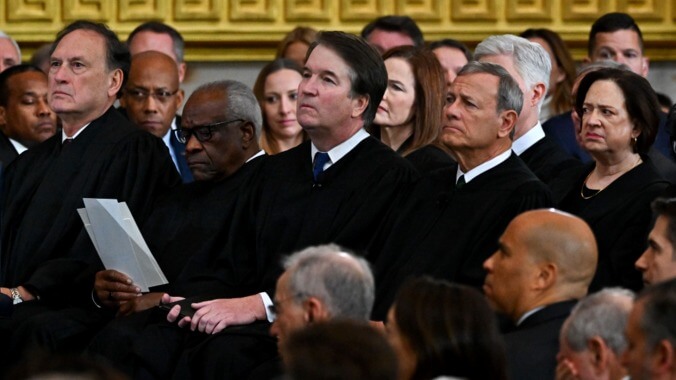Supreme Court Delivers Alarming Ruling on Youth Gender-Affirming Care
The six conservative justices claimed that a Tennessee law is not sex discrimination, and the ruling could have much larger implications for trans adults as well as access to birth control and IVF.
Photo: Getty Images Politics
On Wednesday, the Supreme Court upheld Tennessee’s ban on gender-affirming care for minors, claiming that the law is not sex discrimination. The ruling in U.S. v. Skrmetti was 6-3, written by Chief Justice John Roberts and with the three liberal-appointed justices dissenting. Justice Sonia Sotomayor read her dissent aloud from the bench, which signals a justice feeling particularly strongly about the outcome.
Tennessee’s Senate Bill 1, passed in 2023, prohibits doctors from prescribing puberty blockers or hormone therapy to transgender kids whose parents consent to the treatment, while allowing cisgender children to use the same medications. The law only bans the treatments if the purpose is to help kids live in a way “inconsistent with the minor’s sex”—meaning, a minor assigned male at birth can take testosterone, while a minor assigned female cannot. The ACLU and the Biden Administration sued the state, arguing it is blatant discrimination on the basis of sex.
During arguments in December, the ACLU’s Chase Strangio became the first out trans person to argue a case at the Supreme Court. Meanwhile, the lawyer for Tennessee claimed that transgender care was experimental and offensively compared it to lobotomies and eugenic sterilization.
Advocates warned that a ruling like this could impact care for trans adults, and other kinds of care like birth control and IVF. Currently, 25 states ban puberty blockers or hormone therapy for trans youth and more could follow after this ruling. According to the Williams Institute at UCLA School of Law, at least 110,000 transgender minors live in states that restrict or limit this care.
Roberts wrote that the law does not discriminate on the basis of sex and thereby doesn’t violate the Equal Protection Clause of the Fourteenth Amendment. “Neither of the above classifications turns on sex. Rather, SB1 prohibits healthcare providers from administering puberty blockers and hormones to minors for certain medical uses, regardless of a minor’s sex,” he wrote. “While SB1’s prohibitions reference sex, the Court has never suggested that mere reference to sex is sufficient to trigger heightened scrutiny.”
Roberts concludes by saying that, since the majority doesn’t believe the gender-affirming care ban violates the Fourteenth Amendment, the court is giving lawmakers the ability to restrict or protect the care as they see fit. “We leave questions regarding its policy to the people, their elected representatives, and the democratic process,” he said. This echoes the reasoning in the Dobbs decision that overturned Roe v. Wade—the court is allowing people to have different rights depending on where they live. (Tennessee cited Dobbs 10 times in a brief to the court that argued the law merely regulates medical care and doesn’t discriminate based on sex.)
This is a scary conclusion that could affect more people than just minors. As Strangio said in December: “Critically, Tennessee’s argument that SB 1 is sex-neutral would apply if the state banned this care for adults, too.” Michelle Banker, senior director of reproductive rights and health litigation at the National Women’s Law Center, previously said that Tennessee’s argument could have “really radical implications” for other forms of health care like birth control, as well as certain fertility treatments.